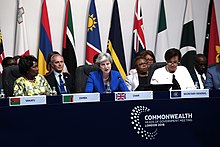The Commonwealth Heads of Government Meeting is a biennial summit meeting of the governmental leaders from all Commonwealth nations. Despite the name, the head of state may be present in the meeting instead of the head of government, especially among semi-presidential states. Every two years the meeting is held in a different member state and is chaired by that nation's respective prime minister or president, who becomes the Commonwealth Chair-in-Office until the next meeting. Queen Elizabeth II, who was the Head of the Commonwealth, attended every CHOGM beginning with Ottawa in 1973 until Perth in 2011, although her formal participation only began in 1997. She was represented by the Prince of Wales at the 2013 meeting as the 87-year-old monarch was curtailing long-distance travel. The Queen attended the 2015 summit in Malta and the 2018 summit in London, but was represented again by the Prince of Wales at the 2022 meeting in Rwanda.

The Head of the Commonwealth is the ceremonial leader who symbolises "the free association of independent member nations" of the Commonwealth of Nations, an intergovernmental organisation that currently comprises 56 sovereign states. There is no set term of office or term limit and the role itself has no constitutional relevance to any of the member states within the Commonwealth. The position is currently held by King Charles III. Head of the Commonwealth is also a title of the monarch of each of the Commonwealth realms according to the Royal Style and Titles Act.

The 2007 Commonwealth Heads of Government Meeting was the 20th Meeting of the Heads of Government of the Commonwealth of Nations. It was held in Kampala, Uganda, between 23 November and 25 November 2007, and was hosted by President Yoweri Museveni.
The 1971 Commonwealth Heads of Government Meeting, officially known as the I Commonwealth Heads Meeting, and commonly known as Singapore 1971, was the first Meeting of the Heads of Government of the Commonwealth of Nations. It was held from 14 to 22 January 1971 in Singapore, and was hosted by that country's Prime Minister, Lee Kuan Yew.
The 1997 Commonwealth Heads of Government Meeting was the 15th Meeting of the Heads of Government of the Commonwealth of Nations. It was held in Edinburgh, Scotland, between 24 October and 27 October 1997, and hosted by Prime Minister Tony Blair.

The 1973 Commonwealth Heads of Government Meeting, officially known as the II Commonwealth Heads Meeting, and commonly known as Ottawa 1973, was the second Meeting of the Heads of Government of the Commonwealth of Nations. It was held from 2 to 10 August 1973 in Ottawa, hosted by Prime Minister Pierre Trudeau. It was the first CHOGM to be attended by the Head of the Commonwealth, Elizabeth II.

The 2011 Commonwealth Heads of Government Meeting, commonly known as CHOGM 2011, was the 22nd Meeting of the Heads of Government of the Commonwealth of Nations. Held in Perth, Western Australia, between 28 and 30 October 2011 and hosted by the Prime Minister Julia Gillard.
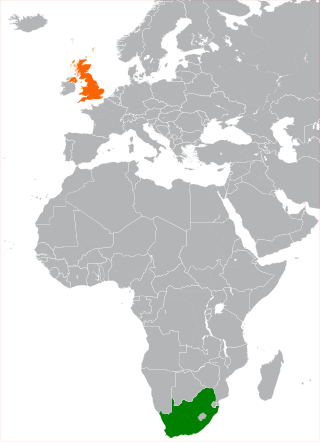
South Africa–United Kingdom relations are the current and historical relationships between the United Kingdom (UK) and the Republic of South Africa. South Africa is the most important trade partner in Africa for the United Kingdom and an important partner for the UK in a number of areas.

The majority of the countries of the Commonwealth of Nations, formerly known as the British Commonwealth, still criminalise sexual acts between consenting adults of the same sex and other forms of sexual orientation, gender identity and expression. Homosexual activity remains a criminal offence in 29 of the 56 sovereign states of the Commonwealth; and legal in only 26.

The 2013 Commonwealth Heads of Government Meeting was the 23rd Meeting of the Heads of Government of the Commonwealth of Nations. It was held in Colombo, Sri Lanka, from 15 to 17 November 2013. Commonwealth leaders agreed on Sri Lanka as the 2013 host for the meeting when they met in Port of Spain, Trinidad and Tobago, in 2009. Sri Lanka, which was originally slated to host the summit in 2011, was accused of committing atrocities during the Sri Lankan civil war and the summit was instead held in Perth, Australia; Colombo was given the 2013 summit instead. The leaders of Canada, Mauritius, and India boycotted the summit, citing alleged human rights violations by Sri Lanka against its Tamil minority. Protests were also banned during the summit. President Mahinda Rajapaksa summarised the summit's events as: "Issues covered in the communique include development, political values, global threats, challenges and Commonwealth cooperation." However, the meeting was overshadowed by controversy over Sri Lanka's human rights record and the alleged war crimes during the final stages of the civil war. This was the first time in 40 years that the Head of the Commonwealth, Queen Elizabeth II, was not present at the CHOGM.
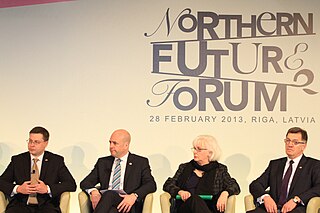
Northern Future Forum is an annual, informal meeting of prime ministers, policy innovators, entrepreneurs and business leaders from the 9 nations of Denmark, Estonia, Finland, Iceland, Latvia, Lithuania, Norway, Sweden and the United Kingdom. Initially referred to as the UK Nordic Baltic Summit, the name Northern Future Forum was introduced at the second meeting in Stockholm, 2012. The group had a period of abeyance since the Stavanger meeting in 2016 was postponed following the outcome of the 2016 United Kingdom European Union membership referendum, and David Cameron subsequently stepping down as UK prime minister, to be succeeded by Theresa May. The summit was reconvened in October 2018 in Oslo.

The 2015 Commonwealth Heads of Government Meeting, also known as CHOGM 2015 was the 24th Meeting of the Heads of Government of the Commonwealth of Nations. It was held in Malta from 27 to 29 November. Sri Lankan President Maithripala Sirisena handed the position of Commonwealth Chair-in-Office to Maltese prime minister Joseph Muscat at the meeting.
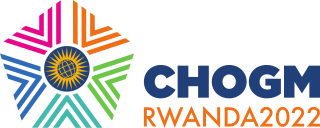
The 2022 Commonwealth Heads of Government Meeting, also known as CHOGM 2022, was the 26th Meeting of the Heads of Government of the Commonwealth of Nations. The meeting was originally scheduled for 26–27 June 2020 in Kigali, Rwanda preceded by various fora between 22 and 25 June, but was postponed twice due to the COVID-19 pandemic. On 31 January 2022, it was announced that the meeting would be held on 24 and 25 June 2022 and the pre-meeting fora held from 20 to 23 June.

Theresa May's tenure as Prime Minister of the United Kingdom began on 13 July 2016 when she accepted an invitation of Queen Elizabeth II to form a government, succeeding David Cameron, and ended on 24 July 2019 upon her resignation. May's premiership was dominated by Brexit, terrorist attacks in Westminster, the Manchester Arena and London Bridge, the Grenfell Tower fire, and the Salisbury poisonings. As prime minister, May also served simultaneously as First Lord of the Treasury, and as Minister for the Civil Service. She also served as Leader of the Conservative Party.

Brexit negotiations in 2018 took place between the United Kingdom and the European Union for the withdrawal of the United Kingdom from the European Union following the United Kingdom European Union membership referendum on 23 June 2016. The negotiating period began on 29 March 2017 when the United Kingdom served the withdrawal notice under Article 50 of the Treaty on European Union. The period for negotiation stated in Article 50 is two years from notification, unless an extension is agreed. In March 2019, British prime minister Theresa May and European leaders negotiated a two-week delay for the Parliament of the United Kingdom to agree on the government's Brexit treaty, moving the date from 29 March 2019 to 12 April 2019. Negotiations between the United Kingdom and the European Union regarding Brexit began in June 2017, with the following negotiations taking place during 2018.
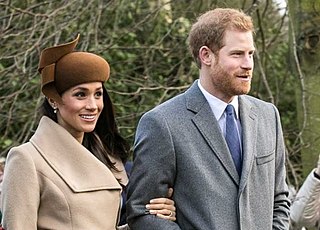
On 8 January 2020, Prince Harry, Duke of Sussex, and Meghan, Duchess of Sussex, announced on Instagram their decision to "step back as 'senior' members" of the British royal family, split their time between the United Kingdom and North America, become financially independent, and only represent the monarchy on a reduced basis. The decision was dubbed Megxit, a portmanteau of the words "Meghan" and "exit" and a play on the term Brexit. The term was adopted globally on mainstream and social media, spawning various Internet memes and "Megxit" merchandising.
Royal tours of Antigua and Barbuda by its royal family have been taking place since the 20th century. Elizabeth II, Queen of Antigua and Barbuda, visited the country thrice: in 1966, 1977, and 1985.

The 2024 Commonwealth Heads of Government Meeting, also known as CHOGM 2024, was the 27th meeting of the heads of government of the Commonwealth of Nations. The meeting was held in Samoa from 25–26 October 2024 and was preceded by ministerial meetings, fora and side events which had begun on 21 October 2024.

